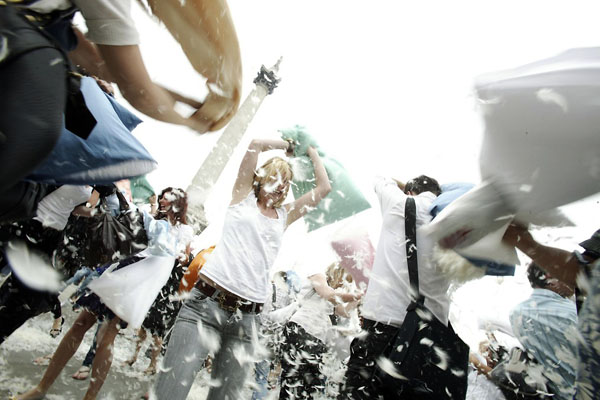
The preconceptions of art are pretty vested in the idea that it is an activity based soley on individual actions. Performance based art emerged and soon became a celebration of collaboration.
One of these mentioned arts is flash mobs - an example in which art deconstructs the stereotype that was created out of traditional art. Similar to Improv Everywhere, flash mob is a performative piece. A flash mob is an event in which a large number of people congregate at a certain place and perform a named activity for a certain amount of time. After completion of the named activity, the participants disperse as if nothing happened.
Flash mobs were first created by Bill Wasik in 2003. At first, the intentions of flash mobs were purely experimental. The socio-cultural experiment that was being conducted was to explore the psychological "needs" of people to fit into a particular "identification" - also known simply as conformity.
The idea that people would do something entirely ridiculous, such as having a world pillow fight, would invite many others to join. People are more willing to do these socially and cultural unacceptable acts when there is encouragement from a group. It’s all part of the sheep mentality – finding your flock to mingle with. I feel this experiment was a good way of bringing attention to the idea of how people react in social situations, especially since it gives a personal insight to analyze oneself.
Anyway, as this experimentation played out, it became more of a trend and part of an underground subculture. Although its intentions were to mock the idea of conformity, flash mobs took an unexpected turn and ironically, people embraced it. The Vancouver Sun wrote, "It may have backfired on him... [Wasik] may instead have ended up giving conformity a vehicle that allowed it to appear nonconforming." Flash mobs became popular for being “unconformist” and turned into a huge performative art venture.
Flash mobs, Improv Everywhere, and other collaborative based works in which random participants join, build a sense of community. In due time, they will perhaps, break the social and cultural barriers that dictate how a person acts when confronted by a total stranger. These norms tell us that we should be rigid, in our place, and “normal”. These sort of barriers tend to keep us from say, turning our head on the bus to talk to a stranger. I deal with this type of harsh mentality too – the kind where you create a space between you and a stranger. Perhaps part of the paranoia stems from the fact that the media tends to inflict a certain amount of fear. The fear of “don’t take candy from strangers” because the media tends to exaggerate the amount of kidnappings, rapes, and etc, that really happen in the world.
People fail to realize that we are all similar beings. We have favorite foods, favorite bands, and stuff like that. With these flash mobs and Improv Everywhere, I feel as if any conversation or word spoken between random strangers is a nice triumph over the spaces that society’s “norms” have shaped for us. I guess we all just have to start looking at people from a different perspective, such as how similar we are as opposed to how different.
I think I may be starting to go off to a tangent now.
2 comments:
I had never heard of Flash Mobs before, but the psychology of it is definitely interesting. If one performs a socially and/or culturally unacceptable act, which he/she would not perform otherwise, just because he/she comes across a bunch of other people doing it, what does that say about him/her? Conversely, if he/she doesn’t join in, what does that say? I know that I am simply reiterating the questions that you have already posed. Sorry I don’t have anything insightful to say, but I think that your observations (and these Flash Mobs) bring up several interesting points that are worth considering.
Have you ever taken Management 5 with Professor McLaughlin? She brought up an interesting point of "what would happen if you get into an elevator with a group of people and just stare at them the whole way up?" After reading your post, I've begun to think more about that situation and it relates entirely to your point. As a society, we've molded ourselves into behavior which is generally quite boring, one would admit, and what would happen if we daresay did something different?
Societies like to fit themselves into molds and often wont budge. Sometimes when you walk around, do you feel like you're living in Victorian England? I do at times because of our structured conformity.
I like how you listed this as a collaborative art. Art is generally something beautiful and unique - and, to see us breaking tradition at times and doing something unique is beautiful in itself as well.
Post a Comment